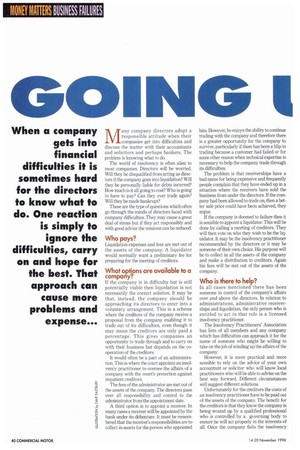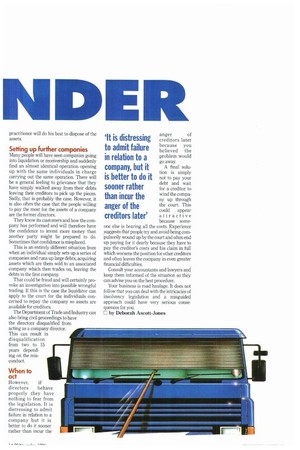GI
Page 42

Page 43

If you've noticed an error in this article please click here to report it so we can fix it.
Many company directors adopt a responsible attitude when their companies get into difficulties and discuss the matter with their accountants and solicitors and perhaps bankers. The problem is knowing what to do.
The world of insolvency is often alien to most companies. Directors will be worried. Will they be disqualified from acting as directors if the company goes into liquidation? Will they be personally liable for debts incurred? How much is it all going to cost? Who is going to have to pay? Can they ever trade again? Will they be made bankrupt?
These are the type of questions which often go through the minds of directors faced with company difficulties. They may cause a great deal of stress but if they act responsibly and with good advice the tensions can be reduced.
Who pays?
Liquidation expenses and fees are met out of the assets of the company. A liquidator would normally want a preliminary fee for preparing for the meeting of creditors.
What options are available to a company?
If the company is in difficulty but is still potentially viable then liquidation is not necessarily the correct solution. It may be that, instead, the company should be approaching its directors to enter into a voluntary arrangement. This is a scheme where the creditors of the company receive a proposal from the company enabling it to trade out of its difficulties, even though it may mean the creditors are only paid a percentage. This gives companies an opportunity to trade through and to carry on with their business but depends on the cooperation of the creditors.
It would often be a part of an administration. This is where the court appoints an insolvency practitioner to oversee the affairs of a company with the court's protection against impatient creditors.
The fees of the administrator are met out of the assets of the company. The directors pass over all responsibility and control to the administrator from'the appointment date.
A third option is to appoint a receiver. In many cases a receiver will be appointed by the bank under its debenture. It must be remembered that the receiver's responsibilities are to collect in assets for the person who appointed him. However; he enjoys the ability to continue trading with the company and therefore there is a greater opportunity for the company to survive, particularly if there has been a blip in trading because a customer had failed or for some other reason when technical expertise is necessary to help the company trade through its difficulties.
The problem is that receiverships have a bad name for being expensive and frequently people complain that they have ended up in a situation where the receivers have sold the business from under the directors. If the company had been allowed to trade on, then a better sale price could have been achieved, they argue.
If the company is doomed to failure then it is sensible to appoint a liquidator. This will be done by calling a meeting of creditors. They will then vote on who they wish to be the liquidator. It may be the insolvency practitioner recommended by the directors or it may be someone of their own choice. His purpose will be to collect in all the assets of the company and make a distribution to creditors. Again his fees will be met out of the assets of the company.
Who is there to help?
In all cases mentioned there has been someone in control of the company's affairs over and above the directors. In relation to administrations, administrative receiverships and liquidation, the only person who is entitled to act in that role is a licensed insolvency practitioner.
The Insolvency Practitioners' Association has lists of all members and any company which has difficulties can approach it for the name of someone who might be willing to take on the job of winding up the affairs of the company.
However, it is more practical and more sensible to rely on the advice of your own accountant or solicitor who will know local practitioners who will be able to advise on the best way forward. Different circumstances will suggest different solutions.
Unfortunately for the creditors the costs of an insolvency practitioner have to be paid out of the assets of the company. The benefit for the creditors is that they know the company is being wound up by a qualified professional who is controlled by a governing body to ensure he will act properly in the interests of all. Once the company fails the insolvency
Setting up further companies
Many people will have seen companies going into liquidation or receivership and suddenly find an almost identical operation opening up with the same individuals in charge carrying out the same operation. There will be a general feeling to grievance that they have simply walked away from their debts leaving their creditors to pick up the pieces. Sadly, that is probably the case. However, it is also often the case that the people willing to pay the most for the assets of a company are the former directors.
They know its customers and how the company has performed and will therefore have the confidence to invest more money than another party might be prepared to do. Sometimes that confidence is misplaced.
This is an entirely different situation from when an individual simply sets up a series of companies and runs up large debts, acquiring assets which are them sold to an associated company which then trades on, leaving the debts in the first company.
That could be fraud and will certainly provoke an investigation into possible wrongful trading. 11 this is the case the liquidator can apply to the court for the individuals concerned to repay the company so assets are available for creditors.
The Department of Trade and Industry can also bring civil proceedings to have the directors disqualified from acting as a company director. This can result in disqualification from two to 15 years depending on the misconduct.
However, if directors behave properly they have nothing to fear from the legislation. It is distressing to admit failure in relation to a company but it is better to do it sooner rather than incur the anger of creditors later because you believed the problem would go away.
A final solution is simply not to pay your debt and wait for a creditor to wind the company up through the court. This could appear attractive because someone else is bearing all the costs. Experience ,suggests that people try and avoid being compulsorily wound up by the court and often end up paying for it dearly because they have to pay the creditor's costs and his claim in full which worsens the position for other creditors and often leaves the company in even greater financial difficulties.
Consult your accountants and lawyers and keep them informed of the situation so they can advise you on the best procedure.
Your business is road haulage. It does not follow that you can deal with the intricacies of insolvency legislation and a misguided approach could have very serious consequences for you.
E by Deborah Ascott-Jones
'It is distressing to admit failure in relation to a company, but it is better to do it sooner rather than incur the anger of the creditors later'
















































































































